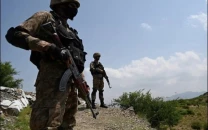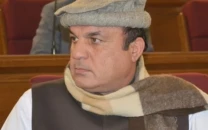UN mission arrives to investigate disappearances
Human rights groups estimate thousands of people have been kidnapped and detained in secret prisons in past decade.

International and Pakistani human rights groups estimate thousands of people have been kidnapped and detained in secret prisons in the past decade, allegedly by security forces.
The Supreme Court is already investigating cases of missing people in the southwestern province of Balochistan, where the military has been accused of rights violations in its bid to put down a separatist insurgency.
"The United Nations Working Group on Enforced or Involuntary Disappearances has arrived in Pakistan at the invitation of the government," UN spokeswoman Ishrat Rizvi told AFP.
She said the high-level delegation led by Olivier de Frouville arrived on Sunday and will stay in Pakistan until September 20.
"The UN experts will gather information on cases of enforced disappearances," the UN said in an earlier statement.
They will also study the "measures adopted by the state to prevent and eradicate enforced disappearances, including issues related to truth, justice and reparation for the victims of enforced disappearances".
The Supreme Court's investigation of the missing in Balochistan is the latest effort aimed at bringing the powerful military and intelligence agencies to book over mass arrests of alleged terror suspects, many of whom are never seen again.
Rights activists have accused the military of mass arrests and extrajudicial executions in its bid to quell a separatist insurgency that erupted in 2004 in Balochistan.
In February, seven men allegedly held by intelligence services appeared before the Supreme Court in Islamabad, more than a year and a half after being detained in connection with terror attacks.
It was an unprecedented development that challenged perceptions that the feared Inter-Services Intelligence agency operates above the law.
"The visit of the group will provide an opportunity to highlight the efforts being undertaken by the government to address this important issue and to further improve the relevant procedures", the foreign ministry said in a statement.
The mission will meet members of the civil society, media, jurists and officials from the foreign and interior ministries to prepare their report.



















COMMENTS
Comments are moderated and generally will be posted if they are on-topic and not abusive.
For more information, please see our Comments FAQ